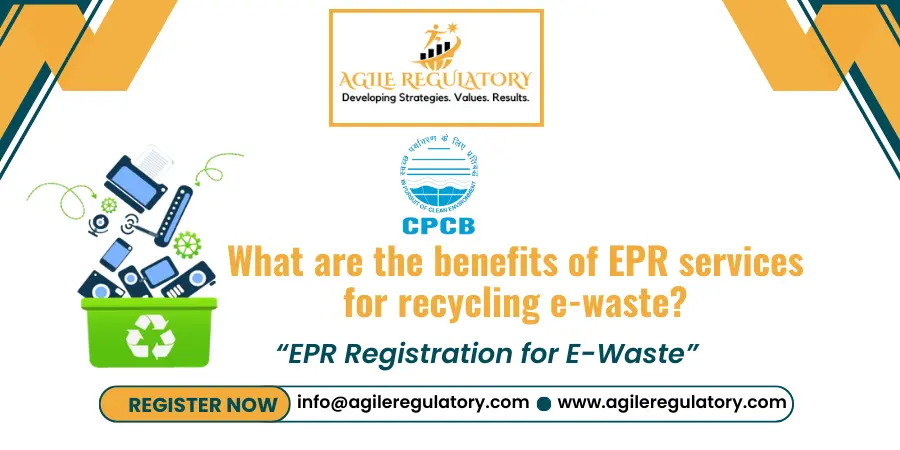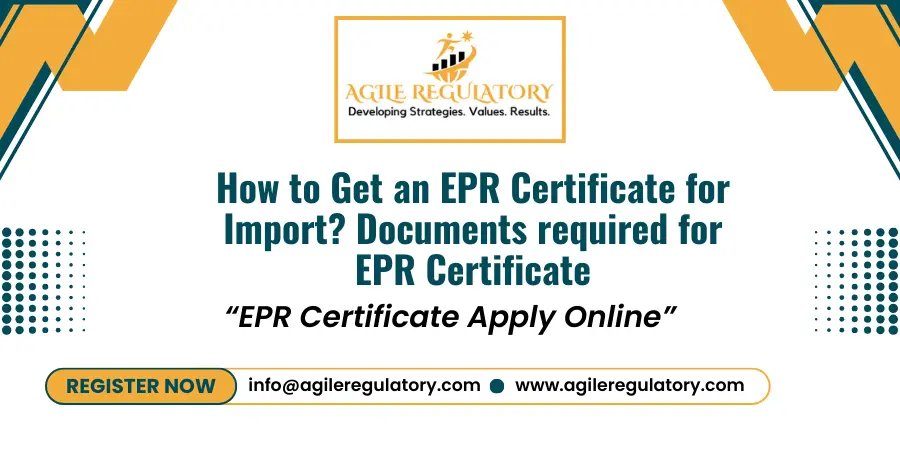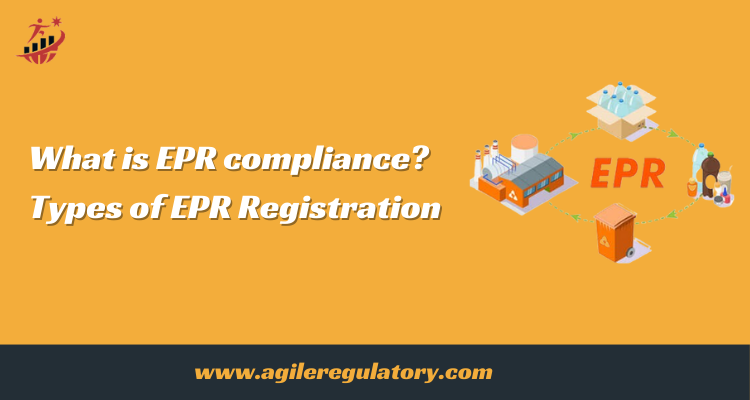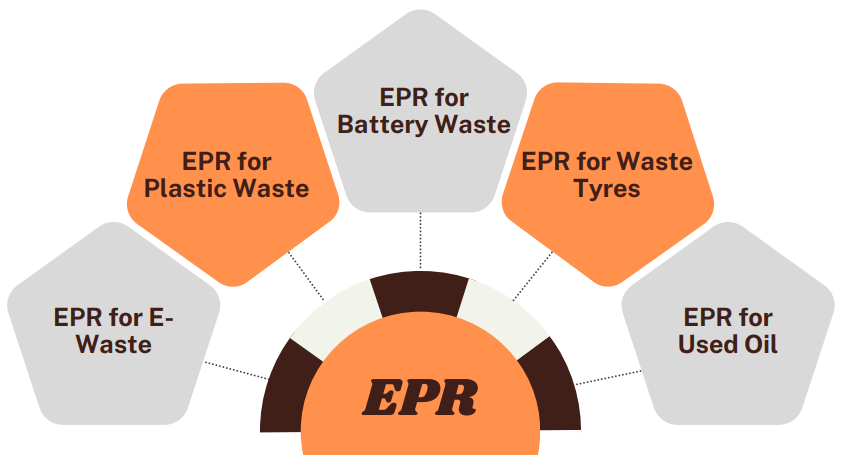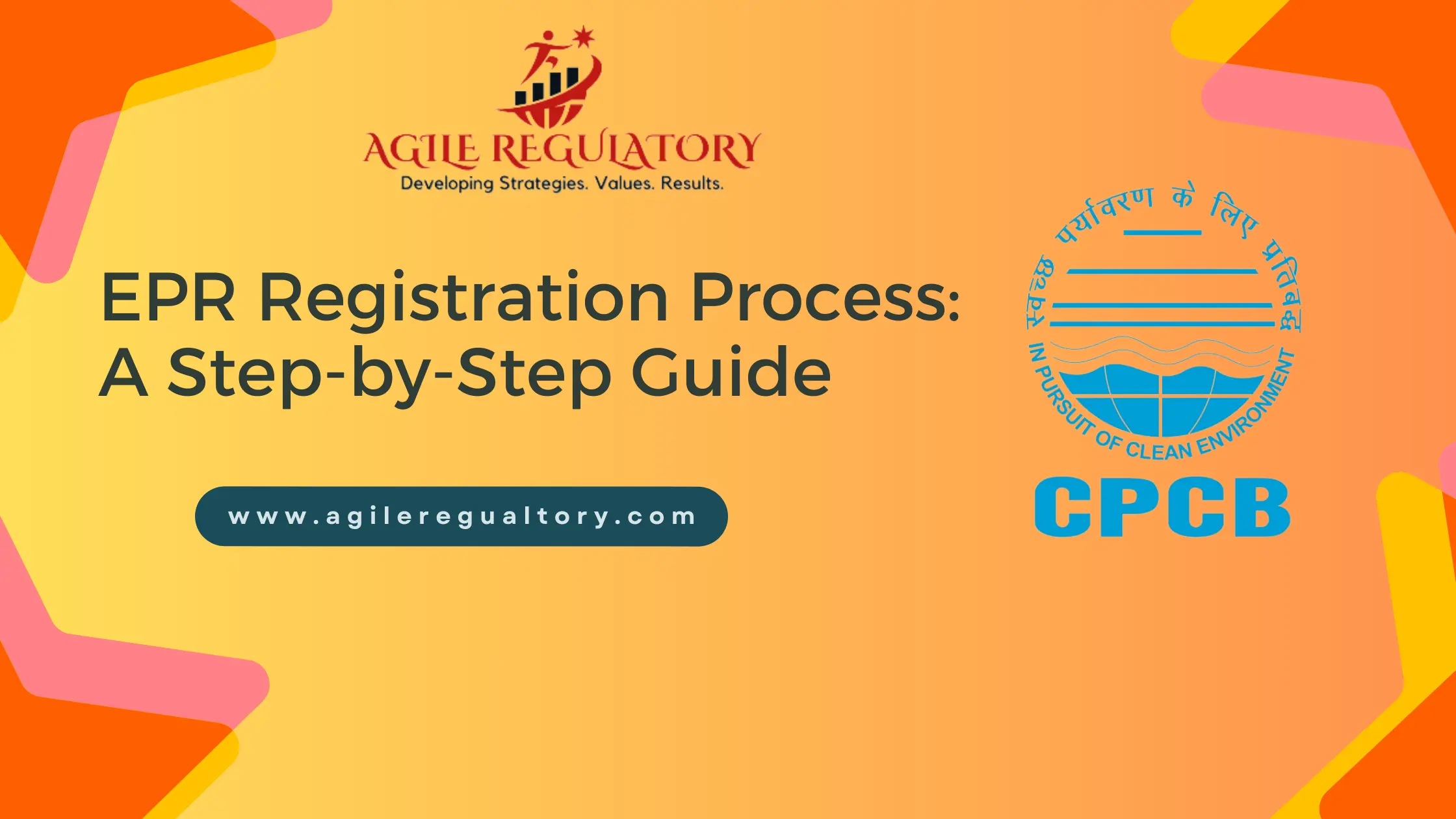
EPR Registration: A Complete Guide!

Overview of EPR Registration
EPR (Extended Producer Responsibility) registration in India is a regulatory certificate mandated under the Plastic Waste, E-Waste, and Battery Waste & Waste Tyre Management Rules. It obligates manufacturers, producers, and brand owners of certain products, such as plastic packaging, electronic goods, batteries, and tyres to take responsibility for the environmentally sound disposal and management of the waste generated from their products. EPR Registration is mandatory for these entities to establish collection mechanisms, recycling processes, and proper disposal systems to minimize the environmental impact of their products throughout their lifecycle. Compliance with EPR Regulations is essential to promote sustainable waste management practices and reduce the burden on landfills and the environment.
Who Issues EPR Registration?
The Central Pollution Control Board (CPCB), under the Ministry of Environment, Forest and Climate Change (MoEF & CC, is the primary regulatory authority in India responsible for implementing and monitoring EPR Rules. CPCB plays a lead role in ensuring that producers, importers, and Brand Owners adhere to EPR guidelines, and it oversees the registration and post-compliance of EPR Registration.
Who is Applicable for EPR Registration?
Producer: A producer is typically the entity that manufactures or produces electronics, plastics, batteries, or tyres.
Importer: An importer is an entity that brings e-waste, plastics waste, battery waste, and waste tyres to India from another country or region.
Brand Owner: A brand owner is an entity that owns electronics, plastics, batteries, and tyre products, even if they don't manufacture or import them directly.
Types of EPR Registration
EPR Registration for E-Waste
EPR Registration for Electronics Waste in India is a regulatory requirement mandated under the E-Waste (Management) Rules, 2016. It obligates manufacturers, importers, and brand owners of electronic products to take responsibility for the proper disposal and management of electronic waste generated from their products. EPR registration requires these entities to establish collection mechanisms, recycling facilities, and environmentally sound disposal systems to minimize the environmental impact of electronic waste. Compliance with EPR Regulations is essential to ensure the responsible handling of electronic waste, reduce the burden on landfills, and promote sustainable practices in the electronics industry.
Documents Required for EPR E-Waste Registration
 KYC of Director/Partner/Proprietor
KYC of Director/Partner/Proprietor
 Copy of GST Registration Certificate
Copy of GST Registration Certificate
 Copy of MSME Registration Certificate
Copy of MSME Registration Certificate
 Company PAN Card
Company PAN Card
 Certificate of Incorporation/Partnership Deed
Certificate of Incorporation/Partnership Deed
 Self-Declaration of RoHS Compliance
Self-Declaration of RoHS Compliance
 Copy of CA Certified Letter
Copy of CA Certified Letter
 List of Products along with Technical Specification
List of Products along with Technical Specification
 A Detailed Copy of the EPR Awareness Plan
A Detailed Copy of the EPR Awareness Plan
 Copy of SPCB Consent CTE/CTO
Copy of SPCB Consent CTE/CTO
EPR Registration for Plastic Waste
EPR Registration for Plastics Waste in India is a regulatory requirement mandated under the Plastic Waste Management Rules, 2016. It mandates manufacturers, importers, and brand owners of plastic products to take responsibility for the environmentally sound management of the plastic waste generated from their products. EPR registration necessitates the establishment of collection, recycling, and disposal mechanisms to minimize the environmental impact of plastic waste, encourage recycling, and reduce littering. Compliance with EPR regulations is crucial to promote responsible plastic waste management practices, mitigate the adverse effects of plastic pollution, and support India's efforts toward a cleaner and more sustainable environment.
Documents Required for EPR Plastic Registration
 Name of Address proof of Authorized Person
Name of Address proof of Authorized Person
 PAN Card of the Company
PAN Card of the Company
 Certificate of Inspiration/Partnership deed
Certificate of Inspiration/Partnership deed
 GST/MSME Registration Certificate
GST/MSME Registration Certificate
 Copy of Import Export Code
Copy of Import Export Code
 Sale/Purchase Invoice for the Financial Year
Sale/Purchase Invoice for the Financial Year
 Copy of Signature of Authorized Person
Copy of Signature of Authorized Person
 Photo of Product along with Packaging
Photo of Product along with Packaging
 Copy of SPCB Consent under Air & water
Copy of SPCB Consent under Air & water
EPR Registration for Battery Waste
EPR Registration for battery waste in India is a regulatory requirement mandated under the Batteries (Management and Handling) Rules, 2001, and subsequent amendments. It imposes responsibility on battery manufacturers, importers, and brand owners to manage and dispose of used batteries in an environmentally sound manner. EPR registration entails establishing collection mechanisms, recycling facilities, and proper disposal systems for used batteries to minimize environmental contamination and health hazards. Compliance with EPR regulations is essential to promote the responsible handling and recycling of battery waste, reduce the risk of toxic substances leaching into the environment, and contribute to a cleaner and safer ecosystem in India.
Documents Required for EPR Battery Waste Registration
 Copy of GST Registration Certificate
Copy of GST Registration Certificate
 PAN Card of Business Entity
PAN Card of Business Entity
 CIN of a business entity
CIN of a business entity
 IEC certificate issued by DGFT
IEC certificate issued by DGFT
 District Industries Center Registration
District Industries Center Registration
 Aadhar & PAN of the authorized person
Aadhar & PAN of the authorized person
 Details and Types of Batteries along with Specification
Details and Types of Batteries along with Specification
 Details of the Battery sales during the Previous Fiscal Years.
Details of the Battery sales during the Previous Fiscal Years.
 Air/Water Act approval and other hazardous authorization issued by SPCBs/PCCs.
Air/Water Act approval and other hazardous authorization issued by SPCBs/PCCs.
EPR Registration for Waste Tyres
EPR Registration for Waste Tyres in India is a regulatory requirement mandated under the Waste Tyre Management Rules, 2016. It places the responsibility on tyre manufacturers, importers, and brand owners to manage and dispose of used tyres in an environmentally responsible manner. EPR registration involves setting up collection systems, recycling facilities, and proper disposal methods for waste tyres, with the aim of reducing environmental pollution, fire hazards, and health risks associated with improper tyre disposal. Compliance with EPR regulations is essential to ensure the sustainable and safe management of waste tyres, minimize adverse environmental impacts, and contribute to a cleaner and more sustainable future for India.
Documents Required for Waste Tyre Registration
 Registration certificate of the business entity
Registration certificate of the business entity
 PAN card of the business entity
PAN card of the business entity
 GST Registration Certificate
GST Registration Certificate
 MSME Registration Certificate
MSME Registration Certificate
 A Copy Notarized Partnership Deed
A Copy Notarized Partnership Deed
 Copy of Import Export Code
Copy of Import Export Code
 PAN And Aadhar of Authorized person
PAN And Aadhar of Authorized person
 Copy of CTE/CTO Under Air and Water Pollution
Copy of CTE/CTO Under Air and Water Pollution
Registration Process of EPR Certification
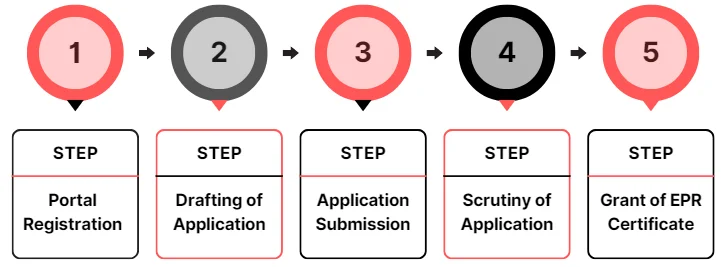
Step 1: Portal Registration: An Applicant has to Create Login ID Credentials online with the CPCB portal by using an email ID and mobile number.
Step 2: Preparation of Application: The manufacturer, importer, and Brand Owner have to Draft the application as per the required forms and formats.
Step 3: Application Submission: Submit the application online through the CPCB portal along with the required documents and applicable formats.
Step 4: Fee Payment: Once the complete document has been submitted, an applicant needs to pay the requisite fee online through UPI/Net banking/IMPS/NEFT.
Step 5: Application Review: A reviewing officer from CPCB will scrutinize the submitted application in order to confirm compliance with CPCB rules.
Step 6: Grant of Certificate: After the successful verification CPCB will issue an EPR Certificate to the producer, importer, and brand owners of e-waste, plastic waste, battery waster, and waste tyres.
Benefits of Having an EPR Registration Certificate
Legal Compliance: EPR Registration ensures compliance with relevant environmental regulations and rules, avoiding legal issues and penalties associated with improper waste management.
Environmental Responsibility: It promotes environmentally responsible practices by obligating businesses to manage their product waste, reducing pollution, and minimizing the impact on landfills and ecosystems.
Brand Reputation Enhancement: Demonstrating commitment to EPR can improve a company's reputation and brand image as consumers increasingly value environmentally conscious businesses.
Cost Efficiency: Implementing efficient waste management practices can lead to cost savings through recycling, reducing disposal fees, and optimizing resource use.
Resource Conservation: EPR encourages the recovery and recycling of valuable resources from waste products, contributing to resource conservation and reducing resource depletion.
Reduced Environmental Impact: Proper waste management reduces the release of harmful substances into the environment, mitigating health and environmental risks.
Innovation and Efficiency: EPR can drive innovation in product design and packaging to minimize waste generation and improve product recyclability.
Support for Circular Economy: EPR aligns with the principles of a circular economy, where products and materials are reused, remanufactured, or recycled, reducing the need for virgin resources.
Mandatory Post Compliances of EPR
Waste Collection and Management: PIBOs are required to establish and maintain mechanisms for the collection and management of waste generated from their products. This includes setting up collection centers, partnering with recycling facilities, and ensuring proper disposal of waste.
Annual Filling: Typically, businesses must submit annual reports to the regulatory authorities detailing their progress in meeting EPR obligations. These reports should include data on waste collection, recycling, and disposal efforts.
Maintaining Records: Businesses should maintain detailed records related to their EPR activities, including records of waste collection, recycling processes, and disposal methods. These records should be available for inspection by regulatory authorities.
Public Awareness and Education: EPR programs require businesses to engage in public awareness and education campaigns to inform consumers about responsible disposal practices and the importance of recycling.
Meeting Recycling Targets: A firm holding an EPR Certificate may have specific recycling targets they must achieve. Meeting these targets is a critical post-compliance obligation to ensure that waste is being effectively recycled and not ending up in landfills.
Conclusion
EPR Registration Certificates represent a dedication to environmental accountability; they go beyond simple bureaucratic obligations. Businesses may lessen their environmental impact, improve their reputation, and help create a society that is healthier and more sustainable by actively taking part in EPR programs. Adopting EPR is a step towards a cleaner, greener, and more affluent future for all, not merely a statutory requirement. Obtaining an EPR Registration Certificate is a commitment to protect the environment for future generations, not just a sign of conformity. Stay Compliant with EPR Registration with the expert guidance and support of experienced environmental engineers at Agile Regulatory.
#Read Related Services in Detail: EPR Registration
Leave a Reply
Your email address will not be published. Required fields are marked *


